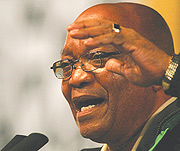So do the twins tethered together at birth venture in separate directions. The two countries, for whom April holds special showers, have forever been intimately, intrinsically Siamese.


So do the twins tethered together at birth venture in separate directions. The two countries, for whom April holds special showers, have forever been intimately, intrinsically Siamese.
Though the origins of their current regimes and identities could not be more different—one through the totality of victory, the other through a diversion from a totality of retribution.
Both countries and both peoples have tried reconciliation. Both have not yet truly saturated bad memories in bright futures.
For a long time South Africa led Rwanda in that direction, and now it is time for Rwanda to leave South Africa behind, or beside, and carry its own torch, and to carry its own legacy.
This past week, the top leadership of the African National Congress, the liberators and founders of the new South Africa, said the party would "never split,” amidst fears of just that.
When it was stated, it was interpreted as a defensive remark, as if, under no circumstances must the ANC split, for if the ANC split, the connotation goes, it would be some sort of failure. It would disturb the legacy of liberation, the legacy of reconciliation and the legacy of the New South Africa.
Under no circumstances, could the ANC split.
Allow to gently and lovingly whisper in the ear of the RPF; now is not the time to follow South Africa, now is the time to lead, to lead into the wilderness, the pristine arboretum of future choices, of true political and social development. Of yes, not being opposed, somewhere down the line, to a split.
Iron grips begin to rust, so Zimbabwe shows us. Why should the ANC never split? What kind of party would that be? Is that the Barack Obama of party politics, looking fearlessly, ready, into the future?
Or is the George Bush of politics, to cling desperately to history, never letting go, even for a moment, preserving a current order in the rhetoric of yesterday?
Their stance seems to be, "We are the ANC, we are the ones that freed the country from evil, and so we must never die.”
That’s where the sadness is, that’s where we see the bridge from idealism to surrealism in the evolution of politics.
An ANC split would apparently mean failure, threatening to destroy everything they have built up.
This is what must be corrected; the image that a split in a political party means the death of that political party, and the death of the legacy that political party built.
In fact, it is the other way around. A split, however superficially sad or devastating to particular politicians, strengthens that party’s base. In effect, the principles of that party become the principles of the country.
What the RPF had fought for, and continues to fight for, democracy and peace, development and the freedom to be who you are—as they themselves have described it—are all founding principles.
It was the same for the ANC in the middle of the 20th century. What they were fighting for were not party interests, they were universal interests. So why the fear? Parties split because they agree on most things but differ on some.
The ANC is not in risk of losing its original ideals because of a party split, rather it will help cement the most important values in the party, while giving the more intimate, practical matters to be debated and explored.
They begin to transcend party politics; where a common denominator of principles is enforced.
So goes the same for the RPF, though their timeline certainly is different from South Africa. The African National Congress has been at the forefront of African consciousness since the 1950s.
When apartheid disintegrated along with the Soviet Union, they were the shining light leading the country out of darkness.
The RPF has been in the same, and in the last fifteen years, they have done a job of translating their beliefs into basic national principles, not just party principles. Most of what the RPF stands for is what everyone in the political environment here should stand for.
Thus, what would be the fear of a split? What would be the fear of showing South Africa how party politics develop?
It’s only a matter of time.
The United States began more or less the same way. There were those who were opposed to the 1776 rebellion against British imperialism, but the majority of Americans believed in the same principles.
The growth of political parties in the United States—however insufficient they are—did not come from a rebellion from the outside of the political forum.
Rather, they come from a long family tree, where one group of people split internally, populated, and repopulated, each with different characteristics, but all from the same lineage.
This is what we must do in Rwanda. A vibrant multi-party system must come future agreements-to-disagree within the RPF. We cannot forget that South Africa has been the shining example of the new Africa for the last 15 years- In reputation and moral responsibility and high-ground.
Ends


